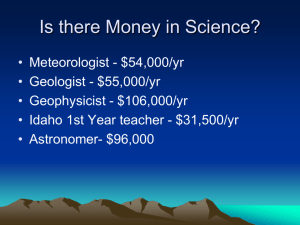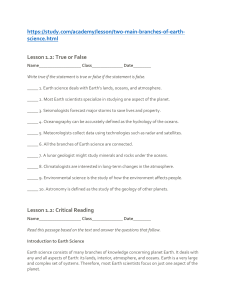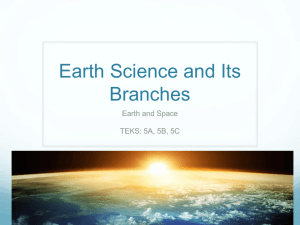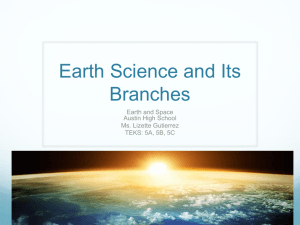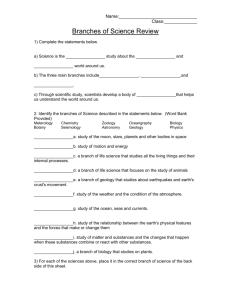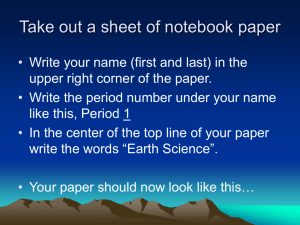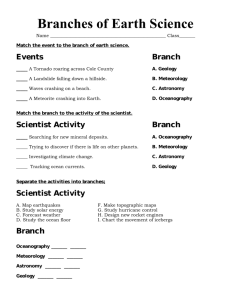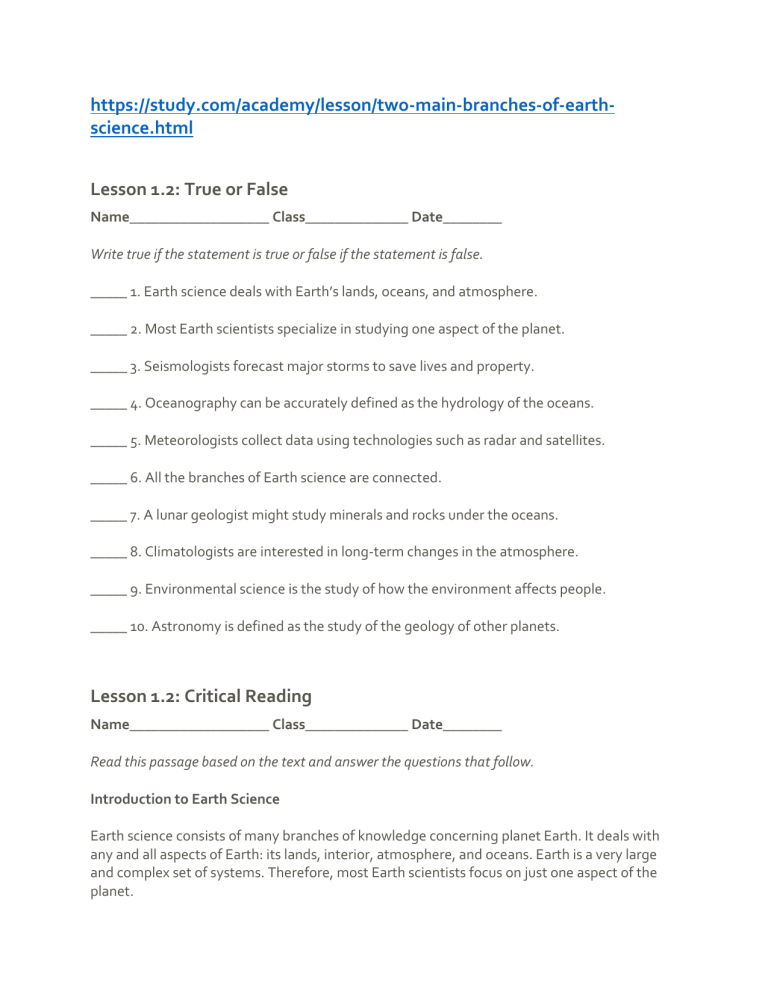
https://study.com/academy/lesson/two-main-branches-of-earthscience.html Lesson 1.2: True or False Name___________________ Class______________ Date________ Write true if the statement is true or false if the statement is false. _____ 1. Earth science deals with Earth’s lands, oceans, and atmosphere. _____ 2. Most Earth scientists specialize in studying one aspect of the planet. _____ 3. Seismologists forecast major storms to save lives and property. _____ 4. Oceanography can be accurately defined as the hydrology of the oceans. _____ 5. Meteorologists collect data using technologies such as radar and satellites. _____ 6. All the branches of Earth science are connected. _____ 7. A lunar geologist might study minerals and rocks under the oceans. _____ 8. Climatologists are interested in long-term changes in the atmosphere. _____ 9. Environmental science is the study of how the environment affects people. _____ 10. Astronomy is defined as the study of the geology of other planets. Lesson 1.2: Critical Reading Name___________________ Class______________ Date________ Read this passage based on the text and answer the questions that follow. Introduction to Earth Science Earth science consists of many branches of knowledge concerning planet Earth. It deals with any and all aspects of Earth: its lands, interior, atmosphere, and oceans. Earth is a very large and complex set of systems. Therefore, most Earth scientists focus on just one aspect of the planet. The main branches of Earth science are geology, meteorology, climatology, oceanography, and environmental science. Each branch has a different focus. For example, geology focuses on Earth’s solid materials and structures and the processes that create them. Geology, in turn, is divided into several branches, including mineralogy, planetary geology, marine geology, and seismology. Mineralogy, for example, is the study of the composition and structure of minerals. Seismology is the study of earthquakes and their causes. Because all of Earth’s systems are interconnected, researchers in different branches of Earth science generally must work together to answer complex questions. Questions 1. What is Earth science? Why does Earth science have many branches? ----------------------------------------------------------------------------------------2. Identify the main branches of Earth science. -------------------------------------------------------------------------------------------3. What is the focus of the branch of Earth science known as geology? How is geology divided into branches? ------------------------------------------------------------------------------------ 4. Why must scientists in different branches of Earth science generally work together to answer complex questions? ------------------------------------------------------------------------------------- Lesson 1.2: Multiple Choice Name___________________ Class______________ Date________ Circle the letter of the correct choice. 1. The main branches of Earth science include a. geology. b. climatology. c. meteorology. d. all of the above 2. Which of the following questions would most likely be addressed by a geologist? a. How do hurricanes form? b. What causes ocean currents? c. What is the composition of rocks? d. How do human actions affect the climate? 3. A planetary geologist might study the a. minerals found inside Earth. b. composition of Earth’s surface. c. minerals and rocks on Mars. d. all of the above 4. A marine geologist might study a. organisms that live in the ocean. b. movements of ocean water. c. rocks on the ocean floor. d. none of the above 5. If a student wants to learn more about tornadoes, she should take a class in a. seismology. b. climatology. c. meteorology. d. environmental science. 6. If an oil company wanted to hire a scientist to locate oil reserves in rocks under Earth’s surface, the company would most likely hire a(n) a. paleontologist. b. hydrologist. c. geologist. d. ecologist. 7. Mineralogy is a branch of a. oceanography. b. astronomy. c. seismology. d. geology. Lesson 1.2: Matching Name___________________ Class______________ Date________ Match each definition with the correct term. Definitions _____ 1. study of fossils _____ 2. study of Earth’s solid materials and structures and the processes that create them _____ 3. study of Earth’s atmosphere _____ 4. study of earthquakes and their causes _____ 5. study of weather and weather patterns _____ 6. broad science that deals with all aspects of planet Earth _____ 7. study of the effects of people on the environment Terms a. geology b. meteorology c. climatology d. paleontology e. environmental science f. Earth science g. seismology Lesson 1.2: Fill in the Blank Name___________________ Class______________ Date________ Fill in the blank with the appropriate term. 1. Scientists who study the composition and structure of minerals are called __________. __________ are scientists you study the geology of other planets. 2. The study of water and its movements, distribution, and quality is __________. 3. The study of everything in the ocean environment is __________. 4. A(n) __________ studies ocean currents, waves, and tides. 5. A(n) __________ studies rocks and geologic processes of ocean basins. 6. A(n) __________ studies life in the oceans. Lesson 1.2: Critical Writing Name___________________ Class______________ Date________ Thoroughly answer the question below. Use appropriate academic vocabulary and clear and complete sentences. What is a question that might be investigated by an environmental scientist? Identify another branch of Earth science that might be called upon to help answer the question. Explain your choice.

